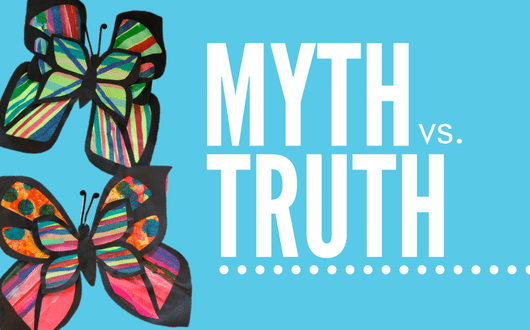Caregiving Mythbusters
Friday May 25, 2018

There are many myths related to dementia and caregiving. And believing them isn’t doing you or anyone any favors, so let’s bust some myths.
Myth: I can handle everything myself. I don’t need any help.
Reality: You will need help. Don’t be afraid to ask for it.
Caregiving is physically and emotionally hard. You will need help. You will need other people to give you a break. You will need someone to listen to your worries. You will need advice. You may need physical assistance in caregiving. Do not try to care for your loved one alone. Find people you can trust and lean on them for support.
Myth: It’s like caring for a child. I have become the parent.
Reality: It is different than caring for a child because your loved one is an adult.
There are some similarities between caring for a child and a loved one with dementia, but there are also glaring differences. When you parent a child, the expectation is that the child will mess up but learn along the way. You train them to become more independent, so one day they will become a productive member of society. When you are caring for a loved one with dementia, your loved one will not get more independent. Tomorrow, your loved one will need more help than he/she does today.
You need to give your loved one the respect and dignity of being treated like an adult. Your mom is still your mom but with cognitive impairment. Your husband is still your husband but with a neurodegenerative disease. Preserve and honor that relationship. You are providing care, not parenting.
Myth: I am a bad caregiver if I use in-home care, day programs, or residential care.
Reality: When you seek outside care options, you are still a great caregiver.
Many caregivers feel deep guilt when deciding to use alternate care for their loved ones. Caregivers can feel selfish for wanting time to themselves or guilty for not being able to carry on at a certain pace. Reaching out for assistance is an act of strength and not an act of weakness.
Choosing to use in-home, residential, or adult day services does not mean you have failed at caregiving. You are still the caregiver; you are just allowing others to assist. No one gives surgeons a guilt trip for asking surgical nurses for assistance. That is the nurse’s job. They are there to help surgeons be successful.
The same is true for caregivers. Having assistance from another care provider doesn’t mean you are weak or a bad caregiver but that your loved one needs more care than one person can provide.
Myth: Now that my loved one has dementia, the good days are over.
Reality: There can still be many good days when your loved one has dementia.
Yes, the disease process is full of challenges for everyone. But there can still be good days, and there can still be joy even though life has changed. The trick is to LIVE IN THE MOMENT. Don’t get too hung up on the little things that don’t matter: The laundry didn’t get done today. My husband put the cereal in the fridge instead of the pantry. Mom said something embarrassing to the waitress.
Learn to laugh with your loved one. Learn to enjoy just being together. Learn to talk about bygone days and share and listen to stories (even if they aren’t always truthful). Cherish the now. (And if you still doubt there can be good days, come see us at Page Robbins. We’re certain we can make you feel differently.)
Myth: Planning for end-of-life decisions hastens death. If I don’t talk about it, it won’t happen.
Reality: Planning ahead gives you peace of mind and a road map for the future.
Planning ahead does not hasten death or illness. Instead, it gives you peace of mind to know that decisions are made and finances are planned. It can save you from having to make difficult medical decisions in a crisis. Planning ahead allows you stop worrying about the future and focus on the day-to-day.
Myth: Everyone with dementia is aggressive, depressed, agitated, inappropriate, etc.
Reality: No two people with dementia are exactly the same.
There’s a saying that goes: “If you have seen 1 person with dementia, you have seen 1 person with dementia.” There are stages and patterns of behavior in dementia, but everyone’s journey is going to be different. Some may wander and have hallucinations, and others may never exhibit those behaviors. Some may have trouble sleeping and a poor appetite, and others may never have those struggles. Each person’s dementia process will be unique.
Myth: My loved one is the only one that (insert embarrassing behavior).
Reality: You can’t shock us, so please ask your embarrassing questions.
Families rarely share something that truly shocks us. If you have questions that you’re embarrassed to ask or situations that you feel awkward talking about, please share them with us. Families often shy away from discussing certain topics with physicians or care professionals because they are ashamed of their loved one’s behavior. Don’t hold back! We don’t judge and neither will others. Don’t let fear of embarrassment hold you back from getting the answers and help you need.




